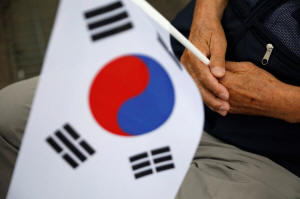South Korea offers talks with North on reunion of war-torn families
 Send a link to a friend
Send a link to a friend
 [September 08, 2022]
By Hyonhee Shin [September 08, 2022]
By Hyonhee Shin
SEOUL (Reuters) -South Korea on Thursday
offered to hold talks with North Korea on reunions of families separated
by the 1950-53 Korean War, in its first direct overture under President
Yoon Suk-yeol despite strained cross-border ties.
The surprise proposal came days before the thanksgiving holiday of
Chuseok, when the two Koreas have in the past held family reunions. But
prospects are not good, with North Korea racing to improve its weapons
and refusing to deal with Yoon's administration.
South Korean Unification Minister Kwon Young-se, who is in charge of
inter-Korean affairs, urged a swift, positive response, saying Seoul
would consider Pyongyang's preferences on a date, venue, agenda and
format of any talks.
"We hope that responsible officials of the two sides will meet in person
as soon as possible for a candid discussion on humanitarian matters
including the issue of separated families," Kwon told a news conference.
Hours after the proposal, South Korea's foreign ministry announced a
revival of high-level talks with the United States, designed to boost
deterrence against the North, which includes a U.S. nuclear umbrella.

The conservative Yoon took office in May vowing to bolster South Korea's
military capabilities and strengthen so-called extended deterrence,
which refers to the ability of the U.S. military, particularly its
nuclear forces, to deter attacks on U.S. allies.
Hong Min, a senior fellow at the South's Korea Institute for National
Unification, said North Korea might see South Korea's offer of dialogue
and deterrence efforts as a sign of what it has called double standards.
The two Koreas have in the past held family reunions around the time of
major holidays, mostly under liberal governments in the South that have
tried to engage with the North.
But cross-border ties have soured. The North has conducted an
unprecedented number of missile tests this year and is believed to have
made preparations for its first nuclear test since 2017.
When asked about the possibility of food aid to the North, Kwon said his
government was not exploring "special incentives" but would be willing
to "consider positively if the North makes other humanitarian requests".
Even if North Korea rejected the offer of talks, South Korea would
"continuously make proposals", he said.
Kwon said the offer would be sent via an inter-Korean hotline to Ri Son-gwon,
director of the North's United Front Department, which handles South
Korea issues.
[to top of second column]
|

A South Korean war veteran holds the
national flag during a ceremony commemorating the 70th anniversary
of the Korean War, near the demilitarized zone separating the two
Koreas, in Cheorwon, South Korea, June 25, 2020. REUTERS/Kim Hong-Ji

Lim Eul-chul, a professor at the Institute for Far Eastern Studies
at Kyungnam University, said chances were slim the North would
accept the offer, citing its recent comments on Yoon.
"Family reunions is a basic humanitarian issue but in reality it
requires a substantial level of trust between both sides," he said.
'AUDACIOUS PLAN'
Yoon has unveiled what he called an "audacious" plan to provide
North Korea with economic aid in return for nuclear disarmament but
has said he would respond sternly to any North Korean provocations.
Kim Yo Jong, the powerful sister of North Korean leader Kim Jong Un,
said last month Yoon should "shut his mouth" and her country would
not sit face to face with him, criticising his plan as "absurd".
Kwon said the proposal for talks was not part of Yoon's aid-for-denuclearisation
initiative but was meant as a step to restart humanitarian exchanges
regardless of the political and military situation.
Lim said Yoon's government was probably not expecting North Korea to
accept the offer but might have seen domestic value in making it,
given Yoon's low approval ratings and cross-border tension.
Families have been separated by a standoff that has persisted since
the 1950-53 Korean War ended in an armistice not a peace treaty.
More than 133,000 South Koreans have registered for family reunions
since 1988, but only about 44,000 of them are still alive as of
August, with 37% in their 80s and 30% in their 90s, Unification
Ministry data showed.

The last family reunions took place in 2018, when Yoon's liberal
predecessor held summits with Kim Jong Un and tried to broker a
peace agreement between North Korea and the United States.
(Reporting by Hyonhee Shin, Soo-hyang Choi and Joori Roh; Editing by
Gerry Doyle, Robert Birsel)
[© 2022 Thomson Reuters. All rights
reserved.]
This material may not be published,
broadcast, rewritten or redistributed.
Thompson Reuters is solely responsible for this content. |